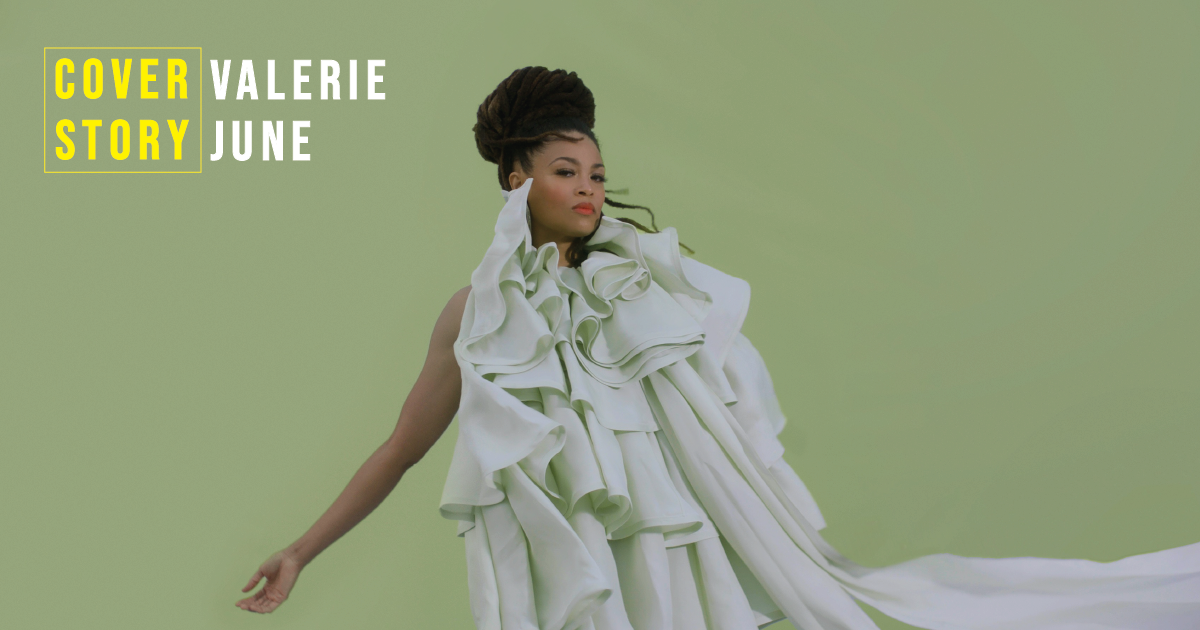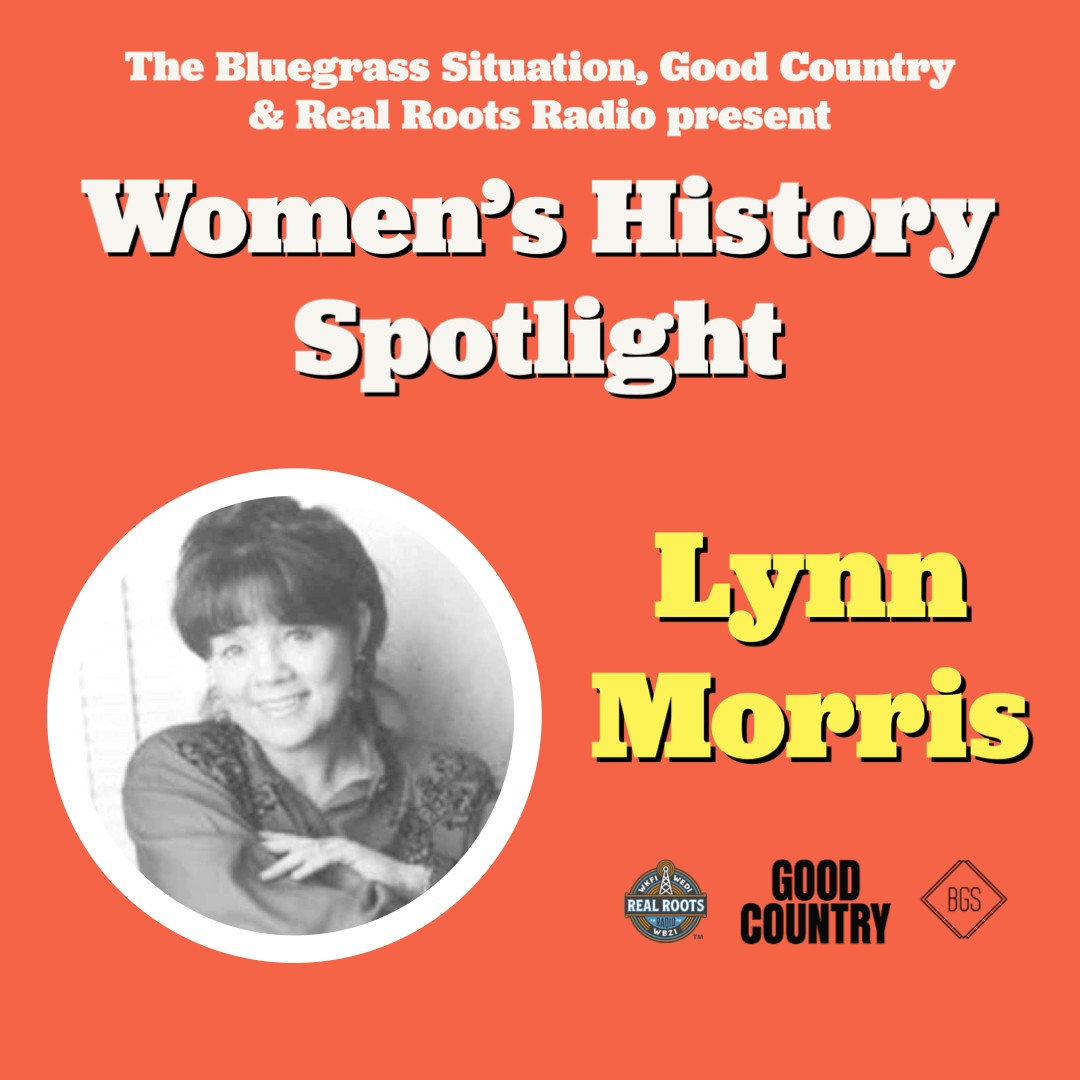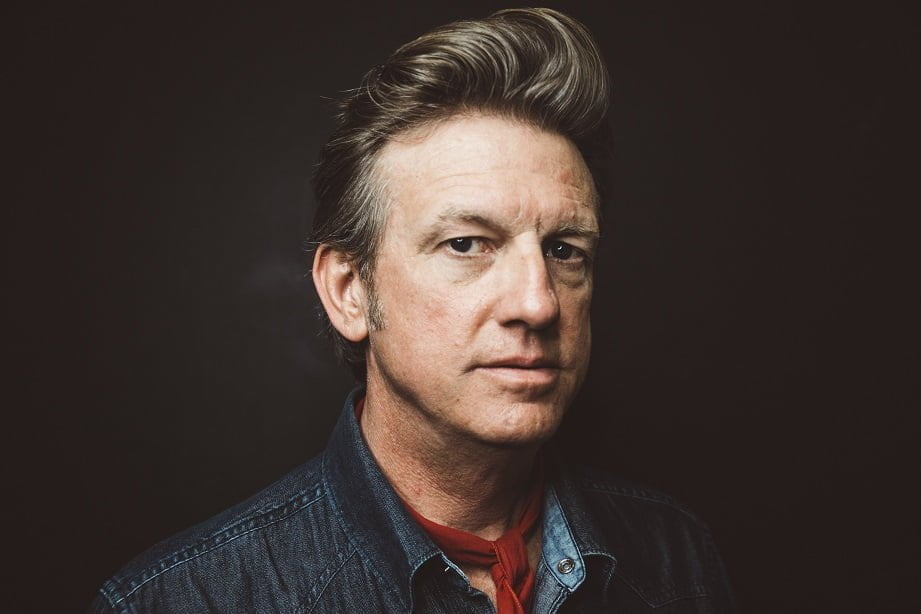Valerie June is in New York today, which means she’s not in Tennessee. When she’s not on the road, the singer-songwriter splits her time between the Big Apple and Humboldt, a small town of 8,500 souls nestled in the northwest corner of the Volunteer State. Known for its annual Strawberry Festival, it’s equidistant from the country music capital of Nashville and her beloved Memphis, but more crucially, her family lives there. “My mom is there, my whole family, and I still have my little room with all my stuff, a closet with all my old outfits and instruments.”
Humboldt is an oasis, where she can escape the city and see something besides concrete and skyscrapers—a place that feels like home. “Tennessee has that very specific personality to it, and sometimes I just don’t want to leave. And I still get down to Memphis or over to Nashville. Nashville is such a booming city, but Memphis is still a little sleepy. That can be great, but it can be bad because you just get so comfortable. There’s really not much push to go and do and explore more than just enjoying life.”
Big or small, famous or not, urban or rural, all of these places inform the music Valerie June makes, especially her most recent album, 2021’s breezily philosophical, buoyantly bluesy, unabashedly optimistic The Moon and Stars: Prescriptions for Dreamers. Those prescriptions, as she calls that round of songs, blend cosmic country with earthy R&B and churchly gospel into a sound that is familiar yet idiosyncratic, as though no one but Valerie June could have written, arranged, or sung these songs. She even brings in two of her Memphis heroes—soul-folk-in-action icon Mavis Staples and Carla Thomas, best known for a string of Stax hits (including “B-A-B-Y”) and for holding her own against Otis Redding.
As she explains, these songs may be grounded in place, but they’re all about dreaming yourself elsewhere—about dreaming as the foundation for a social movement. That idea took on new poignancy during the pandemic, when society seemed to be fraying at the edges, but it turned The Moon and Stars into Valerie June’s breakout album, landing on numerous year-end lists and earning her numerous Americana Music Award nominations as well as a Grammy nomination (her first) for the Best American Roots Song.
For its one-year anniversary, Valerie June added more prescriptions to The Moon and Stars, including new acoustic tracks and covers of songs by Nick Drake (“Pink Moon”), Stephen Foster (“Beautiful Dreamer”), and John Lennon (“Imagine”). In her small studio in her New York apartment, Valerie June sat down, guitar in hand, to speak with The Bluegrass Situation about visiting her different homes, singing with her heroes, and dreaming up a new movement.
BGS: There’s a distinct Memphis flair to this album, especially with the great Carla Thomas on there.
Yes! And Mr. Lester Snell did the string arrangements on this record. He’s an older gentleman who worked with Al Green and Isaac Hayes, Keith Richards, Margo Price, all kinds of people. Yesterday I had this little moment… A lot of times I can be down on myself. Man, I really went wrong there! I’ll just count up my failures. But yesterday I had a day where I was counting my blessings. Oh my god, Carla Thomas is on a record with me! That’s a victory. I’ll take it.
Did the pandemic make her or Mavis hard to get on the record?
I’d already captured “Call Me a Fool” with Carla, and Mavis said she wanted to do the song “Why the Bright Stars Glow.” We were gonna be in the studio together and everything, but when the pandemic hit that March, the world just stopped and she couldn’t do anything. I was even sculpting these ideas—like, could we send some studio engineers over to her house? Get everybody tested and just put the microphone through the mail slot? But it didn’t work, and we had to put the record out without her. But my manager said it was an extra long album cycle due to the pandemic and would I like to do something with some more songs? So, we were able to finally get Mavis. She’s a real saint. Saint Mavis.
Do you remember the first time you heard Mavis or the first time you heard Carla?
Mavis was part of the family growing up. She was like Cousin Mavis. My father would take us on family road trips, and the Staple Singers were always one of the first CDs that he played. And we would all sing along. There were five kids in our family, and everybody had their part.
And I knew Carla’s songs, but I didn’t know they were from her until I moved to Memphis and started studying Memphis music. You can’t live in Memphis without studying Memphis music. It’s everywhere. One year she played the Cooper-Young Festival, this small neighborhood event in Memphis, so I went down and saw her perform. She didn’t perform very much, but she was a star! She was just such a powerhouse, a joyful spirit like Mavis. Maybe that’s what happens when you get to record for Stax!
Can you tell me about the two titles for the album? When it was released last year, I wondered if the whole dream concept was rooted in that pandemic experience.
It was. And the reason why I added The Moon and Stars is similar. I wrote down the moon because the moon was with us every time Jack and I went into the studio. We didn’t plan it that way, but it was the week of a full moon. So, every night we’d enter the studio under a full moon. I wrote down Moon as a title, but I felt like there should be something more. Our last day in the studio, I walked out and there were three shooting stars crossing the sky. Okay, The Moon and Stars! But I still felt like there should be something more.
When the pandemic hit, I thought, our hearts are breaking. They’re breaking for so many reasons—racism, sex discrimination, age discrimination, so many issues. I saw the visions of people like Dr. King and people who’ve been pushing for change—even Mavis and Carla, two people who’ve seen all of these hard times. Carla has seen so much happen in that awesome city of Memphis. She’s seen it change and flip. I was listening to stuff like “A Change Is Gonna Come” and “Respect” and all of these movement songs. All of a sudden this clarity came over me. We can dream and hope for the future, and maybe we just need a prescription. We need a movement.
How do you mean?
There’s a lot of movements happening right now, but if I were to start a movement, what would I want it to be? I want it to be very loving and very hopeful and very positive. I want it to embrace all of humanity and sculpt a more harmonious and beautiful planet. Every movement needs songs. It needs its own “Change Is Gonna Come.” It needs something that will give you hope to open up your wishful mind and use your imagination. That’s what these songs are. They’re very ethereal. They put you in mind of some fantasy, some stardust realm where we look up at the stars and feel enamored. All of this is possible, but we’re drawing from the same cycles of trauma and oppression. It was all some deep thoughts.
So much has happened in the year since the album was released. Has your relationship to the songs changed during that time? Have they revealed new meanings or new implications?
They have changed. I put out the original version with arrangements that I created with Mr. Lester and Jack Splash, and now I’m releasing the new version with some acoustic songs, which have more fiddle and banjo. It was a musical chain, and I love it so much because it shows how songs can live in different realms. I love the beauty and evolution of a song. That’s what I’ve been experiencing with this record, because of the long album cycle. And when we do go on tour, that’ll be another evolution as we go from produced record to stripped-down acoustic versions to the live sound. They’re gonna keep growing and changing.
I like that about covers, too. I’m a songwriter, but I didn’t learn how to play technically. I just play to my own voice when I cover something. I can’t really do it like the original artist did it because I don’t know how to do that. You know, we lost Nick Drake a long time ago, but “Pink Moon” still lives with every person who sings it. It takes on a new character. So, the songs outlive the singer. It can go further and further and further.
The three cover songs on the new version seem to extend that dream theme. Was that planned?
When I was choosing the covers, I wanted songs that either worked with the theme of moon and stars or the theme of dreaming. It had to have “moon” or “dream” in the title. That’s how I chose “Beautiful Dreamer” and “Pink Moon.” And “Imagine” is one of those songs that sums up the record in a lot of ways. John Lennon had this dream for humanity.
And you also did “Summer’s End” on the recent John Prine tribute, Broken Hearts & Dirty Windows Vol. 2. How did that come about?
His label and his team, they know how much I love John. I love his music, and I got to tour with him and sing with him onstage. It was such a high point in my life. And they sent me a letter asking if I wanted to cover that song. And while I was singing it, I started wondering if the reason they asked me to do that song was because it goes [sings] “The moon and stars hang out in bars, just talking, and I still love that picture of us walking.” I was like, What? It was so perfect. I absolutely adore that song and sing it quite a lot on the road.
I wanted to ask about the Grammy nomination. Well, I don’t really have a question, just a congratulations.
Thank you. And thank you on behalf of Carla, too, because it’s huge for both of us. We were nominated for Song of the Year at the Americana Music Awards, and she came up from Memphis to sing with me at the Ryman that night. And she received the Lifetime Achievement Award for Inspiration. Is she not an inspiration to everybody! She was interviewed for the Memphis paper and she said the only thing she wanted was to be nominated for a Grammy. And now look at her!
That must feel good, to take somebody who is a hero and introduce her to a new generation of fans.
It’s true! Sometimes I wonder why we didn’t get her an achievement award sooner. Why does that happen with our elders? They’ve contributed so much and made it so we can be here. That’s what happened with John Prine toward the end of his life, and all the awards and appreciation meant so much to him. I think we need to thank people like John and Carla and Mavis for what they’ve given us. I was grateful for the Americanas and the Grammys for honoring and appreciating this beautiful star, this Queen of Memphis Soul.
Photo Credit: Renata Raksha



